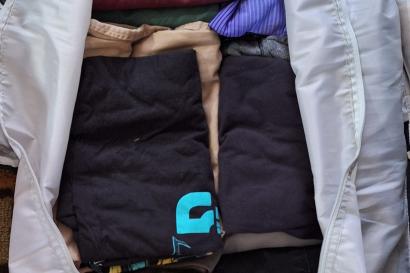I know my last post was all about saying to try new foods, but after my field trip experience today I've started thinking about how my choices affect the world and the people inside it.
Before I get too far ahead of myself, I'll explain what we did today. My Labor Movement and Social Changes in China class had the opportunity to go on a field trip to the Da Wu Group Municipality just outside of Beijing in Hebei Province. The Da Wu group is a privately owned Chinese company established in 1985 by Mr. Sun Dawu. Though they are registered as an Agriculture and Livestock Group they also do business in the fields of construction, food processing, hotels, sports, and education. The purpose of the field trip was for us to visit their land and meet with Mr. Sun for a Q & A session about government policy and the way it affects business in China.
After a long bus ride there, we arrived and began our tour. Shuttle buses drove us through some of the corn fields to the chicken production facility. No. It was not the pens for the chickens or the processing factory, but it was still a bit gruesome so if you're sensitive toward these kinds of things, you may want to skip the next couple paragraphs...
What we were given a tour of was the egg and chick holding facilities. Prior to entering the building our teacher translated our tour guide's explanation of the history of the Da Wu group (they began with 1,000 chickens and 50 pigs in the livestock industry) and the recent innovations that has allowed their company to become one of the major industrial chicken suppliers in China. Basically, this company was the first in China to raise Genetically Modified chickens (GMOs). I'm not going to claim to know the science, but I've seen Food Inc. and done a fair share of my own research on the topic of industrial farming in the U.S. Essentially scientists modify the DNA of chickens so that they are better suited for producing meat, can be raised in less time, etc. It's an efficiency thing and depending on your personal beliefs, it's either a great step forward in technology that's helping solve hunger problems or a giant step in the wrong direction that will further hurt the environment because of things like "superpests" and the lack of knowledge on possible long-term effects. In America, GMO labeling has become a hot issue mainly for those concerned with environmental and health impacts, but also because some consumers don't want to support "Big Agra" and companies like Monstano. I don't want to delve much more into the political explanation of things here. It's a long debate and there are points on both sides. Personally, in America, I avoid GMO foods and eat organic when I have the option (and the money) to do so. I haven't become a vegetarian, but I've given it a serious thought several times and today I gave it another consideration after what I saw today.
It started with us having to put on lab coats, hair nets, face masks, and plastic shoe covers and then walking into one of the buildings. The eggs are kept in large incubators that switch to a higher heat level after two days. The process is streamlined and automatic, making it fast and easy, as our tour guide explained. We walked through these two rooms bothered only a little by the smell and shocked by the sheer amount of eggs in one incubator. For me and most of the others on the trip, what we saw next was a little disturbing. After the chicks hatch from the eggs, they're squished into plastic crates and then hand sorted by gender. The male chicks are put on a conveyor belt and are sent to snake farms and the female chicks are sent into the next room. There they are vaccinated in with large syringes in large groups, and put back into the crates. Then the chicks are dumped out of the crates into a circular machine that grabs then, lifts them up, and cuts off the ends of their beaks (this is done to prevent them from pecking at each other and to reduce food waste because chickens tend to play with their food). We didn't see what happens after this step because they're taken to a different part of the property to be raised (and yes, eventually killed).
I don't pretend to ignore the obvious: if I'm eat meat, it's because some animal died. For some of my friends, this is reason enough not to eat meat and though I've wrestled with it before. I reached the conclusion that humans eating animals can be okay. I do, however, believe the way animals are raised and treated is important and take that into consideration when I buy and consume meat.
At least. In America I do. In China, I've chosen to ignore the differences in food processing laws and production practices partially for convenience sake, but also because I didn't want to miss out on the cultural experiences of trying new foods while I was traveling abroad. Needless to say, this field trip made it impossible for me to just put it in the back of my mind. I spent the rest of the tour trying to decide whether or not I wanted to eat meat in China, or ever again. I chose the the sweet potatoes over the ham, and the green beans over the Kung Pao chicken at the buffet lunch and talked with one of my classmates who is a vegetarian about what she's been eating in China. I thought this decision was complicated enough on its own, however, after concluding the tour and hearing from Mr. Sun, I had even more aspects to consider. I still have to do my own research, but from my observations and the words of Mr. Sun during the interview, his company has done a lot of great things for the community as it's grown. Not only has the company expanded, providing more jobs for people in Hebei, but they're in the process of building a new hospital, have established several schools allowing children of employees to get an education, as well as built a stadium and other sources of entertainment for the area. Mr. Sun also is known for his outspoken beliefs about business and political reform (that's the reason we were really here after all). From what I understood about his business model, practices, and personal beliefs, I wanted to support his company because it does seem to be improving the lives of people and providing valuable services.
But then there's the baby chicks. And my personal beliefs about GMOs and industrial farming. I was still thinking of ways I could change to a vegetarian lifestyle, at least while I'm in China, but then I remembered my upcoming trips to Sichuan for the National Holiday and NingXia a couple weeks later. Not only would it be harder to make this change while I'm on the go, but I would also likely have to give up the chances to try some new (and probably delicious) foods from these areas. My dilemma got even more complicated on the way home when I started reading the poem "September on Jessore Road" by Allen Ginsberg. For those who haven't read it, it's about war and deals with the themes of what an individual can do about the horrors of war other humans are dealing with in different parts of the world. It made the plight of chickens seem a bit less important at first, but then I started questioning that notion too.
All-in all, it's been a long day and a lot of thinking. I still haven't eaten dinner because I still don't know if I want to eat meat. Though being away from home and studying in a foreign country has generally made me feel removed from life in the United States, today made me come to the realization just because I'm not a citizen in the country I'm currently in, doesn't change the fact that I'm a citizen of the world and that my actions have consequences.
Still haven't decided what I'll do in the long run, but I think tonight I'm at least going to avoid anything that includes 鸡肉。

Kelly Cunningham
<p>My name is Kelly Cunningham and I am a Chinese Studies and English major at DePaul University. I love everything about languages-reading them, writing with them, speaking them, etc. I'm studying abroad to improve my Chinese and learn more about the culture.</p>








